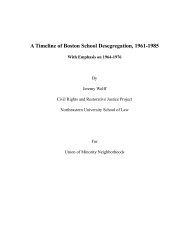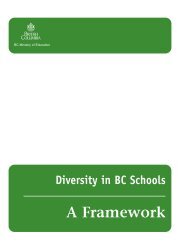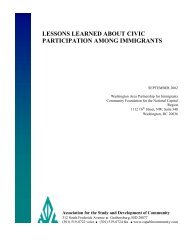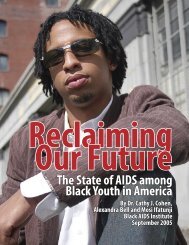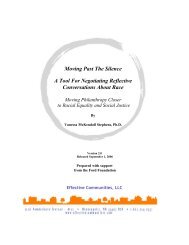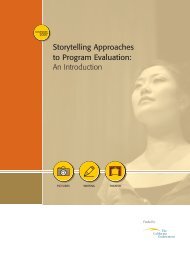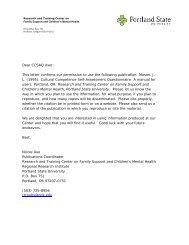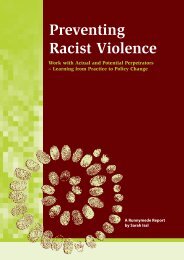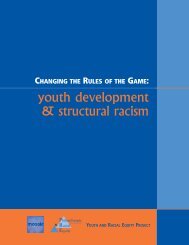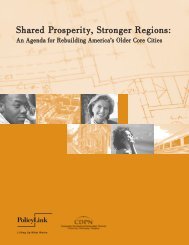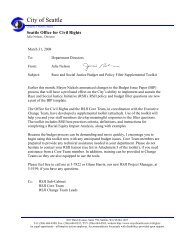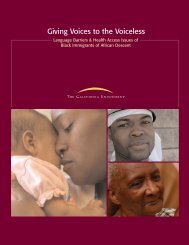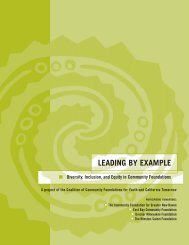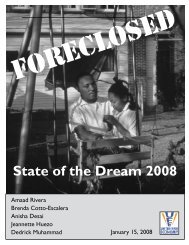Stories of Philanthropic Leadership in Advancing Regional and ...
Stories of Philanthropic Leadership in Advancing Regional and ...
Stories of Philanthropic Leadership in Advancing Regional and ...
Create successful ePaper yourself
Turn your PDF publications into a flip-book with our unique Google optimized e-Paper software.
EQUITABLE PUBLIC INVESTMENTterms. We saw the value <strong>in</strong> PolicyL<strong>in</strong>k br<strong>in</strong>g<strong>in</strong>g thelessons they have learned from other regional equityefforts, as well as the skill to help knit a diverse,cohesive coalition that can br<strong>in</strong>g about policy change<strong>in</strong> the region.”Two other foundations have played key roles <strong>in</strong> theemergence <strong>of</strong> Action! as an <strong>in</strong>fluence <strong>in</strong> regionalpolicy development. As part <strong>of</strong> its grant toPolicyL<strong>in</strong>k, the Fannie Mae Foundation fundedregional conferences to share the f<strong>in</strong>d<strong>in</strong>gs <strong>of</strong> theEquitable Development Toolkit. These conversationsbrought groups together to recognize theopportunity. The Hyams Foundation supplied earlyseed fund<strong>in</strong>g <strong>and</strong> scholarship support to futureAction! members to attend key national events thatframed their subsequent th<strong>in</strong>k<strong>in</strong>g.Go<strong>in</strong>g forward, the evidence <strong>of</strong> home-grownleadership for policy <strong>in</strong>itiatives <strong>and</strong> constituencydevelopment will ultimately determ<strong>in</strong>e thebreadth <strong>and</strong> scope <strong>of</strong> philanthropic supportfor Action!’s efforts.<strong>Regional</strong>/Neighborhood Equity ImpactsAlthough early <strong>in</strong> the process, there are signs thatAction! will be able to achieve policy impact. Thegroup currently has legislation before theMassachusetts State House that would document thedemographics <strong>of</strong> residents <strong>of</strong> state-subsidized hous<strong>in</strong>gdevelopments—a critical miss<strong>in</strong>g piece <strong>of</strong><strong>in</strong>formation <strong>in</strong> the work to elim<strong>in</strong>ate hous<strong>in</strong>gsegregation <strong>in</strong> Massachusetts. The group is alsobr<strong>in</strong>g<strong>in</strong>g new advocacy energy towards the effort to<strong>in</strong>vest <strong>in</strong>creased resources <strong>in</strong>to the state’s affordablehous<strong>in</strong>g trust fund, target<strong>in</strong>g an <strong>in</strong>fusion <strong>of</strong> $100million over the next five years.Action! is work<strong>in</strong>g through adm<strong>in</strong>istrative advocacyto <strong>in</strong>tegrate equity pr<strong>in</strong>ciples <strong>in</strong>to theimplementation <strong>of</strong> a $30 million transit-orienteddevelopment fund. Action! has mobilized allies toengage the state <strong>in</strong> the development <strong>of</strong> its 25-yearvision for transportation plann<strong>in</strong>g <strong>and</strong> <strong>in</strong>vestment <strong>in</strong>an area <strong>of</strong> historically significant disparities from theperspectives <strong>of</strong> local equity advocates. Tocomplement that advocacy, the group is provid<strong>in</strong>gtra<strong>in</strong><strong>in</strong>g to grassroots <strong>and</strong> other organizations longconcerned with transit issues but that have not hadthe experience or technical expertise with which toengage <strong>in</strong> the discussion.ResultsThe Action! process has brought several hundredorganizations across greater Boston together todiscuss the real steps needed to advance regionalequity. In short order, the group began to shape thepolicy discourse for the region, <strong>in</strong>fus<strong>in</strong>g equity <strong>in</strong>toan arena formally devoid <strong>of</strong> the topic. Throughpublic meet<strong>in</strong>gs, op-ed placements, engagement <strong>of</strong>academic <strong>and</strong> bus<strong>in</strong>ess <strong>in</strong>terests, <strong>and</strong> direct advocacywith lawmakers, Action! is demonstrat<strong>in</strong>g new waysfor philanthropy to <strong>in</strong>vest <strong>in</strong> improved communityoutcomes that serve all populations <strong>in</strong> the region.“We would like to seestatewide policyadvocates work<strong>in</strong>gwith grassrootsadvocates to craftpolicy,” states Barr’sPuerto, “but not <strong>in</strong> away <strong>of</strong> ‘we have thispolicy, why not signon?’ We would loveto see an equalpartnership emerge.”Lessons Learned“We would like to seestatewide policy advocateswork<strong>in</strong>g with grassrootsadvocates to craft policy, butnot <strong>in</strong> a way <strong>of</strong> ‘we have thispolicy, why not sign on?’We would love to see anequal partnership emerge.”— Mariella Tan PuertoTo be sure, progress is deliberate, <strong>and</strong> does not comeeasily. But even <strong>in</strong> engag<strong>in</strong>g the challenges that facethe work, foundations <strong>and</strong> their community partnersare learn<strong>in</strong>g valuable lessons.The first lesson is that suburban communities <strong>and</strong>urban centers have common causes. When asufficient concentration <strong>of</strong> suburban leadershipjo<strong>in</strong>ed discussions <strong>of</strong> regional issues, it quicklybecame clear that several preconceptions <strong>of</strong> suburbanperspectives needed re-evaluation. Mutual concernsabout equitable hous<strong>in</strong>g distribution, the regionwideimplications <strong>of</strong> environmental justice oncommunity health, <strong>and</strong> the connection betweentransportation equity <strong>and</strong> workforce developmentcreated a sense <strong>of</strong> possibility that concerted statewideadvocacy is possible.Second, <strong>in</strong>herent tension exists between the <strong>in</strong>ertia <strong>of</strong>public <strong>in</strong>stitutions <strong>and</strong> the capacity <strong>of</strong> communitybasedorganizations to endure the extensivetimeframes <strong>of</strong> regional plann<strong>in</strong>g processes. Mostnonpr<strong>of</strong>it organizations cannot afford to <strong>in</strong>vest thestaff<strong>in</strong>g required for a multi-year plann<strong>in</strong>g process<strong>and</strong> exit with negligible products to show for their55Funders’ Network for Smart Growth <strong>and</strong> Livable Communities



